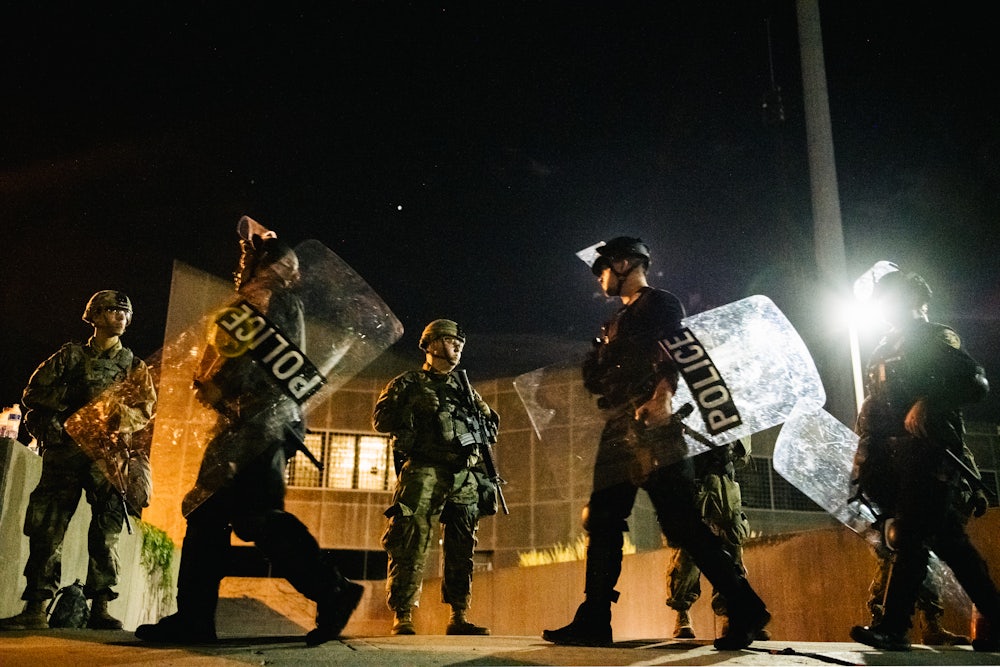There have only been 12 days in 2020 in which police did not kill someone in the United States. As of August 22, the day before Officer Rusten Sheskey of the Kenosha Police Department shot and paralyzed Jacob Blake, police nationwide had killed 751 people this year, according to the Mapping Police Violence database. Going by years past, it’s entirely reasonable to assume that very few of the officers who have killed people in 2020 will be charged with a crime, and even fewer will be convicted. It is not an exaggeration to say that almost every day in this country, police get away with murder.
Police know this. So do others who see themselves as agents of law and order, like the ad hoc militia assembled on Facebook in the days following the Kenosha police shooting, with the call, “Any patriots willing to take up arms and defend our city tonight from evil thugs?” One who answered, Kyle Rittenhouse, stalked the streets of Kenosha with a rifle on the night of August 25. The white 17-year-old probably didn’t have those precise numbers in his head—of how many police have killed, how many have gotten away with it. Before the night was over, Rittenhouse had allegedly shot and killed two people and injured another. Afterward, Rittenhouse wandered past police cars, still armed. He was allowed to flee the state. Before his first court appearance, he had already become a hero to the far right.
We know the police take the side of white vigilantes, as my colleague Alex Pareene wrote earlier this summer. When far-right groups and even these more ad hoc formations of right-wing novices descend on a town to wage violence against Black Lives Matter protesters, he wrote that police allow them to do so with “something more than impunity: an endorsement.” And these groups, in turn, are learning something from law enforcement’s stance toward them: Police and their tacit support endows right-wing militias with some of that impunity.
Trump’s supporters in law enforcement and government play Kenosha as both a threat of what’s to come and an invitation to join in. Ron Johnson, the senior Republican senator from Wisconsin, said on CNN that one way to stop “the violence” and “the rioting” was to call on “citizen soldiers.” (In a statement to The New Republic, Johnson’s communications director said that the senator was referring to the National Guard when invoking “citizen soldiers” and that “he was not calling for vigilantes.”) The head of New York’s largest police union, Pat Lynch, said on a Trump campaign press call on Monday that Joe Biden was a “Democratic apologist” for violence, who, if elected, would turn the whole country into Kenosha or Portland.
The same day, when asked if the White House would say anything about Kyle Rittenhouse, or if it believes vigilantes should stop showing up in cities to allegedly protect buildings, press secretary Kayleigh McEnany did not give an answer. She did say, though, that the U.S. “should have more police, not less.” On Tuesday, Trump will travel to Kenosha, where he will meet with police. He has remained silent as someone apparently took his own words as a directive: “When the looting starts, the shooting starts.”
For a president to stoke all this might appear to complicate his campaigning for reelection on a “law and order” mission. “Trump openly represents law and order without the rule of law—that is, whatever he means by ‘order’ applied lawlessly,” as Greg Sargent argued Monday in The Washington Post. But this skips over the truth borne out in raw numbers: The police, the state-sanctioned agents of law and order, can behave just as “lawlessly” in the name of maintaining it. Right-wing militias and less organized white supremacist and far-right vigilantes operate by the same logic. Law and order and violence come together.
Even if the criminal legal system catches up with the militia members and vigilantes, they can expect an outpouring of right-wing approval, with Tucker Carlson mounting their defense, and with the six-figure online fundraising hauls that come with all of it. They are a brotherhood of George Zimmermans, who was acquitted on all charges in the killing of Trayvon Martin in 2013. They are made folk heroes: Rittenhouse’s image was spotted days later on a T-shirt in Modesto, California, with the words “American Hero,” worn by a man at an event billing itself “Straight Pride,” attended by far-right groups like the Proud Boys, outside a Planned Parenthood.
When these people kill, like police have, they can rest easy in the knowledge that it will take the same criminal legal system that supports them to convict them. They know that for everyone who condemns such a killing as murder, there will be some—maybe more—who welcome it as justice.
